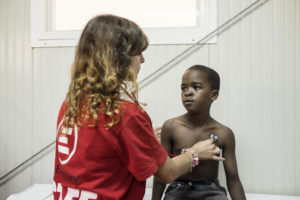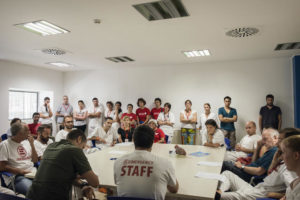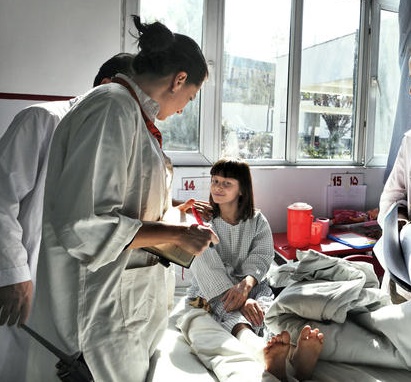Important facts
This role requires complete and autonomous management (including surgical procedures) in both Gynaecology and Obstetrics, and considerable experience in carrying out ultrasound.
Background and organisation of work
The international Gynaecologist coordinates, supervises and works alongside the local personnel (over 30 nurses and midwives) in the treatment of gynaecological and obstetric pathologies, in the operating theatre and the out patients department. She will work in collaboration with the General Surgeon to meet certain clinical requirements. At times a resident physician (Obstetrics and Gynaecology) will be present to support clinical activity or research.
She is responsible to the Medical Coordinator, who is in charge of the management and organisation of the project.
The main areas of work are:
- OUT PATIENTS DEPARTMENT: treatment room and ultrasound room;
- WARDS: 6-bed ward;
- DELIVERY ROOM;
- OPERATING THEATRE: equipped to carry out the main obstetric and gynaecological emergency procedures.
The international gynaecologist is present in the hospital 6 days a week, and is always on-call in case of emergency. The staff management plan provides for 2 international Gynaecologists and 2 Midwives, working alongside local nurses and midwives. Following the accreditation of the Centre as part of the national Health authority in 2011, local doctors specialising in Obstetrics and Gynaecology are also present.
Duties and Reponsiblities
All EMERGENCY international personnel are expected to know and follow the hospital admissions criteria, guidelines, protocols, and the diagnosis and treatment standards in use in the Centre and to ensure the correct compilation of clinical records and statistics in both computer and paper formats.
The main duties and responsibilities of the international specialist in Obstetrics and Gynaecology are:
- management of obstetric and gynaecological pathologies;
- management, supervision and coordination of activity in operating theatre;
- responsibility for the obstetric emergency department, clinic and ward;
- mentoring of resident physicians (where present);
- assisting in clinical research and record keeping as required by the scientific programmes of the specialist sector of the Medical Division of EMERGENCY.
Management and training of local personell
The international Gynaecologist works with the Midwife to provide on-the-job training in theory and practice to the national trainee medical colleagues, midwives and nurses. This is achieved through working alongside the national staff on a day-to-day basis, and constantly monitoring the level of clinical independence reached. There is also provision for more specific teaching activities, managed by the international specialists, in accordance with the clinical protocols in use and as agreed with the Medical Coordinator.
Since 2011 she has been responsible for the training of Afghan (female) doctors undertaking specialisation at our Centre, by means of lectures, but above all through on-the-job training.
 Caseload and equipment
Caseload and equipment
The technological level of the equipment present in the Centres is suited to the clinical and managerial protocols in use, and the level of professional autonomy of the national staff, with the aim of achieving – and sustaining – high standards of care. Diagnostic equipment, basic laboratory tests, technical and auxiliary services are always available.
MATERNITY CENTRE – Anabah, Afghanistan
The Maternity Centre is the only facility in the region specialised in Obstetrics, Gynaecology and Neonatology.It is open 24 hours a day for emergencies, and 6 days a week for clinical services. The Centre is the referral point for a network of First Aid Posts (FAPs) and Health Centres operating an antenatal care programme.
In December 2016 we inaugurated the new Anabah Maternity Centre. The old centre, which opened in 2003, had become too small to cope with the increased number of births, which had risen to over 500 per month. The new centre has four delivery rooms, two operating theatres, a neonatal intensive care ward and step-down unit, an intensive care ward for women suffering birth complications, four clinics, a gynaecology ward, an obstetrics ward, a follow-up area and a labour area.
To make treatment more accessible, check-up and follow-up examinations are performed in the EMERGENCY FAPs and Health Centres in the Valley: in 2016, 609 women were referred in labour and 13,120 obstetric and gynaecological examinations were provided.
Both expert and resident gynaecologists are faced with pathologies and obstetric complications of a significantly different nature and frequency from those encountered in their home countries. Eclampsia, uterine rupture, placenta praevia, placental abruption and major foetal malformations are not uncommon. Vaginal delivery of breech presentations, twins and following a previous caesarean section are routine procedures. The main risk factors in terms of obstetric pathologies among the local population are grand multiparity, scarce antenatal monitoring and care (and consequent extreme difficulty in making an early diagnosis of pathology, e.g. hypertension), and not infrequent consanguineous marriage.
The available equipment includes:
- OPD: ultrasound with vaginal and abdominal probes;
- DELIVERY ROOM: cardiotocography, Kiwi ventouse cup, sets for episiotomy and suturing of lacerations;
- OPERATING THEATRE: multiple sets for Caesarean section, abdominal and vaginal hysterectomy, curettage; a vacuum aspiration device is also available.
 Guidelines, Protocols and Equipment
Guidelines, Protocols and Equipment
Further information on the guidelines, protocols and clinical services relevant to the post along with details of the instruments and equipment available will be provided at interview and during the period of preparation for the mission.
Specific requirements
- Medical Degree, and current professional registration on the medical register of your Country of residence;
- specialisation in Obstetrics and Gynaecology with at least 5 years’ relevant professional experience;
- relevant experience in hospitals with a birth centre;
- experience in the delivery room and in the main obstetric and gynaecological surgical procedures;
- this role is open to female personnel only.
Required availabilty
6 months’ overseas stay including a period of leave to be taken at the end of the mission in agreement with the coordinator. Shorter missions may only be considered for specific needs as defined by the organisation.
Are you interested?
If you are interested please write an e-mail to fo.recruiting@emergency.it.

